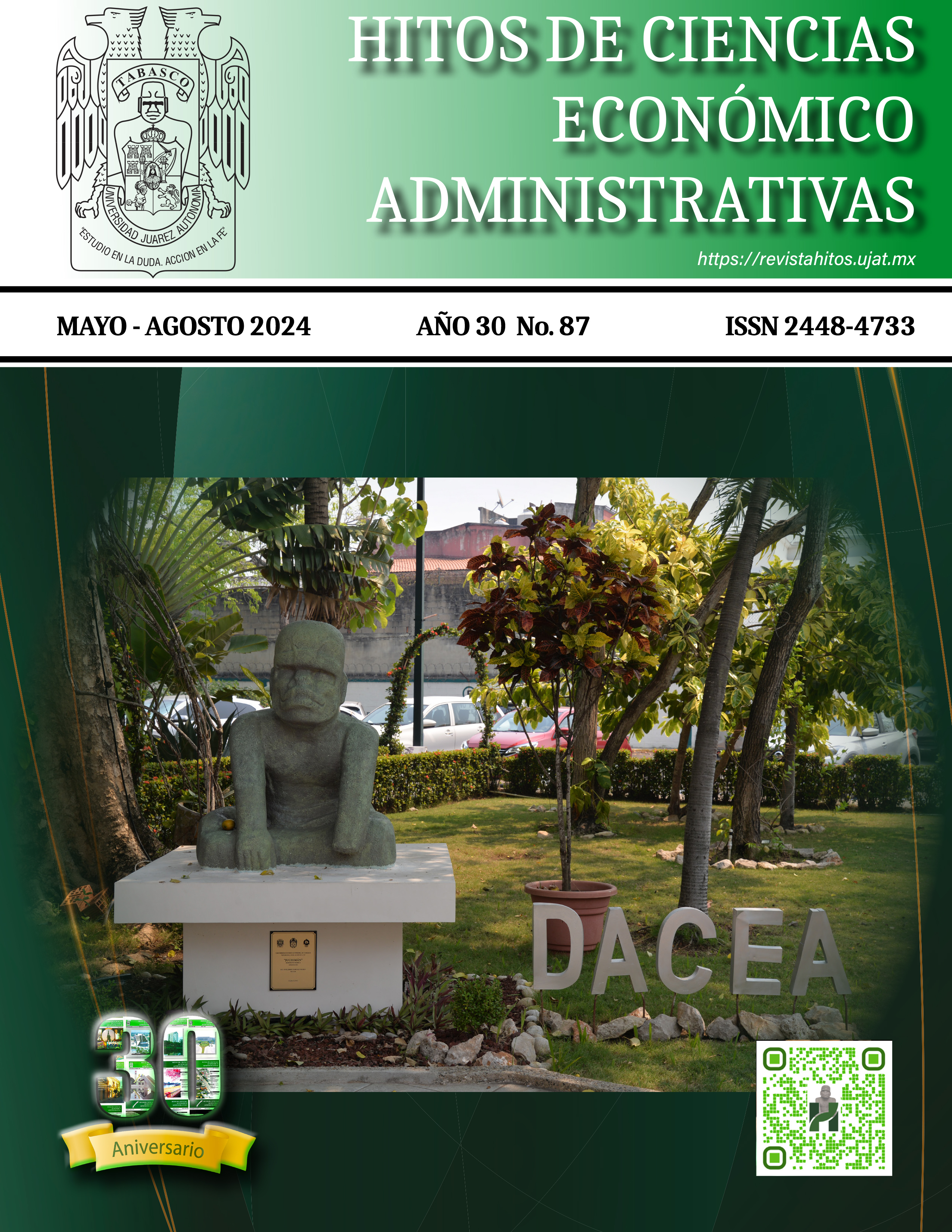Application of the EFA to Measure the Relationship between Engagement,Organizational Climate and Work Performance in Workers of High School Education Subsystems
DOI:
https://doi.org/10.19136/hitos.a30n87.6323Keywords:
Working conditions, Quality of service, Exploratory Factor Analysis (EFA).Abstract
OBJECTIVE: To identify underlying structures between the constructs: Engagement, Organizational Climate and Work Performance in workers of High School Education Institutions (HSEI) in the State of Tabasco, through an Exploratory Factor Analysis (EFA).
MATERIAL AND METHOD: A statistical analysis was carried out with a quantitative deductive approach, with a non-experimental cross-sectional design. The sample consisted of 125 workers from nine subsystems in Tabasco. The EFA was applied, using the maximum likelihood extraction method and the varimax rotation with Kaiser normalization.
RESULTS: The 16 identified factors explained 62.46% of the total variance of the data. The adjustment capacity of the model was significant (p = 0.018), this strengthens the validity of the factor analysis. The results indicate that the questionnaire satisfactorily measures three dimensions: Engagement, Organizational Climate and Work Performance, identifying an underlying structure close to the theoretical model.
CONCLUSIONS: The questionnaire successfully showed the dimensions and, in the database close to the theoretical model an underlying structure was identified. In addition, the existing relationship between organizational and work factors was identified, highlighting its importance for the proper functioning of the High School Education Institutions (HSEI).
Downloads
References
Bakker, A. B. (2011). An evidence-based model of work engagement. Current Directions in Psychological Science, 20(4), 265-269. https://journals.sagepub.com/doi/abs/10.1177/0963721411414534
Chiang, M. M., Fuentealba, I. I. y Nova, R. A. (2017). Relación entre clima organizacional y engagement, en dos fundaciones sociales, sin fines de lucro, de la Región del Bio Bio. Ciencia y Trabajo. 19(59), 105-112. http://dx.doi.org/10.4067/S0718-24492017000200105
Diario Oficial de la Federación. (2023). Ley Orgánica de la Administración Pública Federal. Última reforma publicada DOF 01-12-2023. https://www.dof.gob.mx/nota_detalle.php?codigo=5710167&fecha=01/12/2023#gsc.tab=0
González, Y. (2019). Competencias laborales y clima organizacional como predictores del desempeño organizacional en una institución de educación superior privada. Ciencia Administrativa, 2. https://www.uv.mx/iiesca/files/2020/02/02CA201902.pdf
Hair Jr., J. F., Black, W. C., Babin, B. J. y Anderson, R. E. (2014). Multivariate Data Analysis: Pearson new international edition (7a ed.). Pearson.
Instituto Nacional para la Evaluación de la Educación. (2019). Informe de Evaluación a la Política de Infraestructura Física Educativa de la Educación Obligatoria en México. Informe final.
Koys, D. J. y DeCottis, T. A. (1991). Inductive Measures of Psychological Climate. Human Relations, 44(3), 265-285. https://doi.org/10.1177/001872679104400304
Salanova, M. y Schaufeli, W. B. (2008). A cross-national study of work engagement as a mediator between job resources and proactive behavior. The International Journal of Human Resource Management, 19(1), 116-131. http://doi.org/10.1080/09585190701763982
Schaufeli, W. B. y Bakker, A. (2004). Utrecht Work Engagement Scale: Preliminary manual. Occupational Health Psychology Unit, 1-58. https://www.wilmarschaufeli.nl/publications/Schaufeli/Test%20Manuals/Test_manual_UWES_English.pdf
Vera-Silva, C. y Gouveia, R. (2015). Development and validation of a self-reported measure of job performance. Social Indicators Research, 126(1), 279–307. https://doi.org/10.1007/s11205-015-0883-z
Downloads
Published
Issue
Section
License
Copyright (c) 2024 Universidad Juárez Autónoma de Tabasco

This work is licensed under a Creative Commons Attribution-NonCommercial-ShareAlike 4.0 International License.
As a requirement for the manuscript, the author is requested to provide the Copyright Assignment Letter, so that the Journal has the publication rights and to avoid plagiarism.
PLAGIARISM POLICIES
The Editorial Board of the Journal HITOS DE CIENCIAS ECONÓMICO ADMINISTRAIVAS has the authority to reject in the review process any manuscript that does not have adequate citation in the documents consulted in its scientific research work, which can be considered as plagiarism behaviors. Likewise, the referees carry out the plagiarism review using specialized software, such as iThenticate, among others.
COPYRIGHT POLICIES
Authors who have publications in the journal accept the following terms: • At the time the manuscript is accepted, the author transfers the copyright to the Journal HITOS DE CIENCIAS ECONÓMICO ADMINISTRATIVAS.
- The authors may make additional agreements for non-exclusive distribution of the published version of the article (e.g., including it in an institutional repository or publishing it in a book) provided that the initial publication in this journal is indicated.
- Authors are allowed and recommended to publish their research work on the Internet (eg, institutional or personal files), which would allow more beneficial exchanges to increase the citation of the published work.
This work is licensed under Creative Commons Attribution-NonCommercial-NoDerivatives 4.0 International





